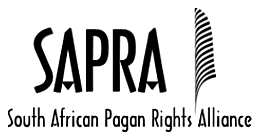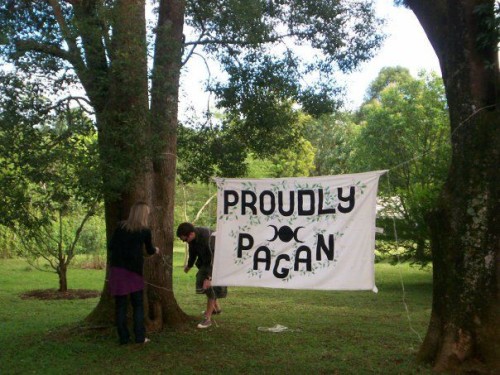SOUTH AFRICA — After years of lobbying by Pagan groups in the country, the South African Law Reform Commission has determined that portions of that nation’s Witchcraft Suppression Act are unconstitutional. Witches should be able to identify themselves as such, the commission found, as well as practice divination. However, the proposed replacement law still has its problems, according to members of the South African Pagan Rights Alliance, because it singles out “harmful witchcraft practices” for regulation on the basis that they can cause “intimidation with the intent to cause psychological distress or terror.” SAPRA members are drafting a response to the bill and hope to see changes in it before it becomes law. The Witchcraft Suppression Act of 1957 is, like most similar laws in African nations, based on 1735 Witchcraft Act of the United Kingdom, which was itself repealed in 1951. SAPRA requested a review of this law in 2007, an effort which was joined by the South African Pagan Council and the Traditional Healers Association. That slow process has finally resulted in the release of a lengthy issue paper by the SALRC, an independent body created in 1973 to investigate South African laws and make recommendations to the national and provincial governments for reform.
The Witchcraft Suppression Act of 1957 is, like most similar laws in African nations, based on 1735 Witchcraft Act of the United Kingdom, which was itself repealed in 1951. SAPRA requested a review of this law in 2007, an effort which was joined by the South African Pagan Council and the Traditional Healers Association. That slow process has finally resulted in the release of a lengthy issue paper by the SALRC, an independent body created in 1973 to investigate South African laws and make recommendations to the national and provincial governments for reform.
In that issue paper, members of the SALRC agreed that by making it illegal to identify as a Witch, the act violates the right to religious expression guaranteed in the South African constitution. Part of the problem stemmed from the fact that there is no definition of Witchcraft in the legislation. In other words, Wiccans and other Pagans fell into the same category as those who are more traditionally considered Witches in sub-Saharan Africa, a place where the word “witch” is often associated with people who use supernatural powers to cause harm.
Where the SALRC paper deviates from the hoped-for outcome is in how it tries to make distinctions between the different uses of the word “witch.” According to Damon Leff, who has been working on this cause for years, “The draft bill is focused on preventing accusations of witchcraft and witch-hunts, human mutilations and ritual murder, and what the Commission calls ‘harmful witchcraft practices.’ ” In Leff’s view, that lumps together actions which should be unacceptable for any person to commit with beliefs that are protected.
We believe that existing laws may be used to deal with human mutilations and ritual murder – we already have a Human Tissues Act which prohibits the harvest and sale of human body parts, and murder is already illegal. We also believe that what the Commission calls ‘harmful witchcraft practices,’ in the absence of actual demonstrable criminal activity, cannot be proven in any court of law to exist without reference to belief, and since the Bill of Rights protects the right to belief, ‘witchcraft beliefs’ aught to play no role in the determination of actual criminal guilt.
The bill has apparently been structured to address concerns that the widespread belief in malevolent magic makes it possible for one person to cause very real harm to another by convincing them that they intend to cast such a spell. Leff provided a copy of the response that SAPRA is drafting, which lays it out thus:
Whilst certain crimes may indeed be motivated by belief, those crimes identified in the Commission’s definition of alleged ‘harmful witchcraft’ practices, specifically, intimidation with the intent to cause psychological distress or terror, may be committed by a member of any (or no) religious faith. Indeed, there is sufficient evidence to show that some Christians and Traditional Healers have in the past attempted to justify their criminal acts by appealing to their beliefs as motivation for such acts.
Traditional healers may also underlie muti murders, committed to obtain a specific human body part for the purposes of healing another. Children, the elderly and disabled are most susceptible to these kinds of attacks. The draft response reads:
SAPRA must argue that since the perpetrators of such practices, specifically those who trade in human body parts, do not self-identify as Witches or as practitioners of Witchcraft, but have in the past been identified as traditional healers or as practitioners of traditional African religion (who do not self-identify as Witches), the application of the term ‘witchcraft’ to such practices constitutes an equally inaccurate misnomer. Muthi murders have nothing to do with Witchcraft, because actual Witches are not the perpetrators of such crimes.
Instead, they argue, such crimes should be enforced under the existing Human Tissues Act, which was passed specifically to prevent such crimes.
From the SALRC issue paper, it appears that the Traditional Healers Organization has pushed for a clear definition of Witchcraft in a new law, and regulation of the harmful practices associated with it. Traditional healers, according to Leff, would never identify as “Witches” because of the strong cultural bias against the term, which has only been challenged recently with the spread of Wicca and related religions.

Pagan Freedom Day in South Africa [Photo Credit: Ginney May / Wikimedia]
In short, SAPRA’s position is that laws should be based on verifiable evidence of wrongdoing, and no crime should be associated with a belief system such as Witchcraft, since heinous acts can be committed by anyone regardless of their religion or lack thereof. The comment period on the draft bill and related issue paper ends in April, and it could be another year before it is presented as a white paper, and submitted to parliament for consideration.
“If the SALRC goes ahead with the proposal, the Bill will be sent to Parliament for review before it is published, and only after that, could it become an Act of Parliament,” explained Leff. “We plan to stop that from happening.”
The Wild Hunt is not responsible for links to external content.
To join a conversation on this post:
Visit our The Wild Hunt subreddit! Point your favorite browser to https://www.reddit.com/r/The_Wild_Hunt_News/, then click “JOIN”. Make sure to click the bell, too, to be notified of new articles posted to our subreddit.
Wow, talk about a half-full, half-empty situation. Is SAPRA going to ask Pagans in other countries to put their oar in?
The closing date for public comment on the Issue Paper and proposed replacement Bill is 30 April 2016. I am not aware of any rule that prevents non-South Africans from submitting comment. For more information on submissions, see http://www.paganrightsalliance.org/update-review-of-witchcraft-suppression-act/
Thank you.
“In that issue paper, members of the SALRC agreed that by making it illegal to identify as a Witch, the act violates the right to religious expression guaranteed in the South African constitution. Part of the problem stemmed from the fact that there is no definition of Witchcraft in the legislation. In other words, Wiccans and other Pagans fell into the same category as those who are more traditionally considered Witches in sub-Saharan Africa, a place where the word “witch” is often associated with people who use supernatural powers to cause harm. – See more at: http://wildhunt.org/2016/01/south-africas-witchcraft-suppression-act-ruled-unconstitutional.html#sthash.wnTs4uov.dpuf”
In theory and in practice, specifying in legislation what constitutes witchcraft for the purpose of defining who is or isn’t protected by the law creates a tiered system that not only protects but effectively promotes a particular vision for what it means to be a witch and practice witchcraft. The road to hell is paved with good intentions, and what not.
And what happens when you find somebody who is a practicing witch who does in fact wish harm upon somebody? Contrary to what appears to be popular opinion, witchcraft isn’t all white light and butterfly farts. Insert “No True Scottsman” fallacy here.
For the sake of legislation and legal action in a court of law, the question is not whether or not a person may use non-physical means to cause harm to another, but how one can prove that in the absence of actual demonstrable criminal evidence.
The USA has anti-bullying and anti-intimidation laws that do not require actual physical harm, only the credible threat of same. The key word is “credible;” if I believe in malevolent witches’ powers, is a threat to curse me legally credible?
Damon has been working on this for over a very long time, I only found out about it in 2007 and had reported on it several times in ACTION while it ran. South Africa like much of Africa, India, some parts of Asia, Some of the Muslim countries and the South Sea Islands still have people who are accused, tortured,beaten burned, or otherwise killed just for being accused as Witches. So it is important to be aware of that the alleged Burning Times never ended, just moved to different territories, including South America.
If they are really capable of being harmful, I don’t see why they would worry about a law. Who would be foolish enough to try to enforce it. (Apuleius Defense)
When some of us attended the 1999 Parliament of the World’s Religions in Cape Town, we were cautioned in advance by the Parliament against using the word “witch” as our self-identification, for all the reasons laid out in this article. It’s encouraging to see that change is happening — much praise and support for the members of the South African Pagan Rights Alliance, who’ve spent many years working for this.
Thank you Andras.